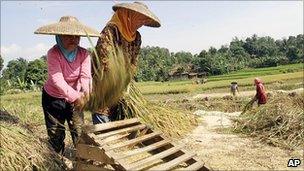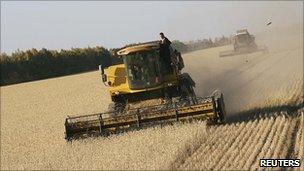UN eases fears amid rising food prices
- Published

The price of staple foods such as rice remain high for the poorest people
Recent sharp rises in food prices do not point to a repeat of the food price spike in 2007-8, a UN conference has been told.
An extraordinary meeting of the UN's Food and Agriculture Organization (FAO) in Rome heard that global conditions had changed.
The overall harvest in 2010 could also be the third highest on record, delegates were told.
The meeting was called after grain prices hit a two-year high.
The FAO's top grain expert, Abdolreza Abbassian, said "there is always concern" about important food security crops such as wheat or rice.
"I don't want to undermine that," he said.
"However, the spillover effects are nothing like we had in 2007-8, because a lot of other conditions that we had in 2007-8 which led to that sort of situation fortunately are not present."
The rise in prices then was the first sign that things had gone badly wrong in the global economy, heralding the worst financial meltdown since the 1930s.
This week's extraordinary meeting was called after the price of grain hit a two-year high at a time of year when the harvest in the northern hemisphere should be pushing prices down.
Russia has already imposed an export ban after its crop was badly hit by drought in the summer, sparking fears that the world could be heading once again for a price spike.
But despite the serious flooding in other large producer nations - including Pakistan and China - during the summer months, there are many differences between now and then, in particular a more stable oil market.
Stability in oil prices matters for food production because oil is essential in the fertiliser industry and in moving goods to market.
High oil prices also make it more attractive to plant biofuels, which compete with food crops for scarce land.
For the hundreds of millions of people in the world living on less than $1.25 (£0.78) a day, these are worrying times.
But Mr Abbassian said that "in Africa they don't eat wheat", adding there was price stability in other food crops.

Droughts in Russia have led to a ban on exports of grain this year
Global stocks are also high and the overall harvest in 2010 could be the third highest on record.
But food prices remain high for the poorest people and the head of global communications for the World Food Programme, Greg Barrow, told the BBC that lessons have been learned since the food price shock in 2007-8.
In particular, there is a new awareness that the solution to hunger might not be just in food aid.
"Food might be there on the markets, but people don't have the resources to buy it because it is too expensive," he said.
That might mean that ration cards and other supports to help people secure food is the best solution.
"What we have put in place to make things better for people in the poorest, least developed countries is a greater awareness that access to food is critical."
Mr Barrow agreed with the FAO conclusions. But the hope is that a volatile market does not turn into a sustained upward trend, and countries have agreed new measures to try to stabilise prices.
Appeals from various UN leaders that speculators should not gamble on the food price market have not been heeded, which can make the markets even more volatile and at risk of sharp movements.
- Published31 May 2011
- Published24 September 2010
- Published6 August 2010
- Published3 September 2010
- Published2 September 2010
- Published26 August 2010